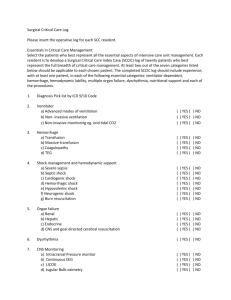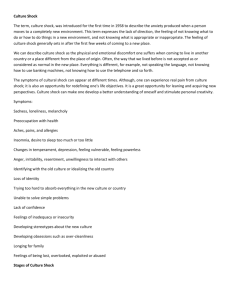Culture Shock
advertisement
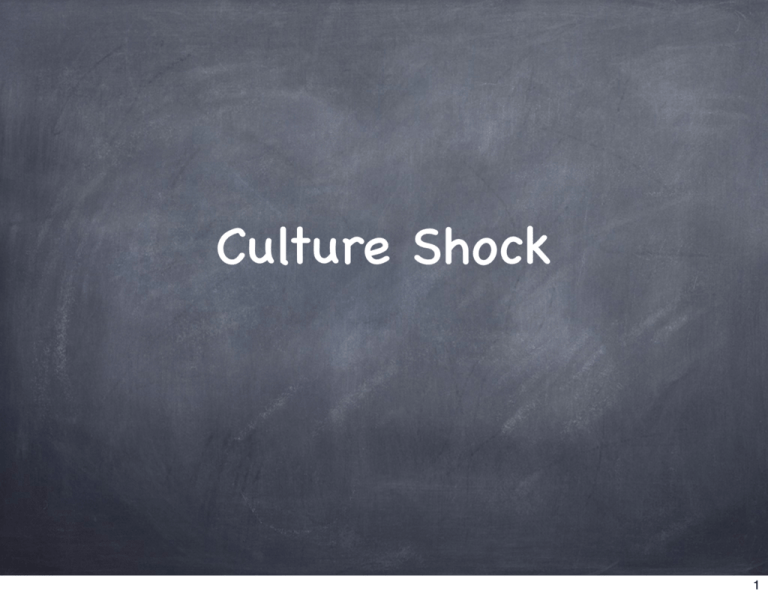
Culture Shock 1 Culture Shock is . . . “at the very heart of the cross-cultural learning experience, self-understanding, and change (Adler, 1987) ” 2 Human Response to Change Performance ! 1. Sudden Awareness 7. Problem Solving 2. Denial 3. Blame Others 4. Blame Self Confusion Time ! 6. Acceptance 5. Immobilization 3 Dependence on Signs & Cues We all depend on hundreds of signs and cues to function in our environment. But, in a new culture many of these things are gone. New ways of doing things. New ways of thinking. New ways of valuing. 4 Causes of Culture Shock Three basic causes of culture shock stand out: 1. The loss of usual sues, signs and signals. 2. The collapse of normal interpersonal interaction. 3. A sense of danger to our personal unity. 5 Culture Shock is . . . The stress associated with adapting to a new culture or unusual context. The continuous, repeated occasions of disorientation through the loss of familiar signs, cues, and symbols used in social interaction. 6 U-curve anticipation adaptation shock, disorientation, identity crisis 7 Cycle of Culture Shock Phase 4: Phase 1: Tourist Back to Normal Phase phase (Euphoria) Phase 2: Crisis phase (Depression) Phase 3: Readjustment phase (Rebuilding) 8 Stages of Culture Shock Preliminary Stage Making plans to leave Airplane tickets, passport, visa Packing and mailing clothing and books 9 Stages of Culture Shock Spectator Stage Sojourner sees many strange sights Has many new experiences Meets new people Things happen so fast, everything is a blur This honeymoon stage lasts from a few days up to 6 months. 10 Stages of Culture Shock (con’t) Participant Stage Sightseeing has ended, sojourner must fend for himself Housing, food, shopping, commuting, banking Must begin to accomplish tasks 11 Stages of Culture Shock (con’t) Shock Stage Problems surface, many of which sojourner can’t handle by himself. Feeling of depression, lethargic irritable, critical of host country Tired of strange food; Work quality declines Feeling that the local people are indifferent to one’s struggles 12 Stages of Culture Shock (con’t) Adaptation Stage If this stage is reached, sojourner has progressed satisfactorily. In-group relations develop with locals Sense of belonging and acceptance develops 13 Symptoms of Culture Shock (Ecoshock) They can be… Physiologically based Psychologically (Emotionally) based Social (Communication) based 14 Physiologically Based Overly concerned with health and cleanliness. Not feeling “well.” Constant headache Tension in neck and shoulders Upset stomach Sleeplessness Low energy level. Fatigue, feeling of being run-down or burned-out. 15 Psychologically (Emotionally) Based Feelings of powerlessness & helplessness. Fear of being cheated or robbed. Fear of injury. Homesickness (desire for home and friends). Stress, anxiety, loneliness, irritability, frustration, paranoia, disorientation, defensiveness. 16 Social (Communication) Based Withdrawal from relationships and conversations. Excessive frustration and complaining. “Local natives” bashing. Defensive communication style. 17 “Withdrawal” Symptoms Physical and/or psychological withdrawal Excessive sleeping/reading Only seeing others from your own culture Short attention span Diminished Productivity Inability to Work Effectively 18 “Aggressive” Symptoms Compulsive eating/drinking Exaggerated Cleanliness Irritability Stereotyping Verbal/Physical Aggressiveness Hostility towards host nationals 19 Symptoms of Culture Shock Anxiety Helplessness Depression Self-doubt Feelings of Inadequacy 20 Homesickness Boredom Fatigue Paranoia Physical Ailments 21 W-Curve Theory According to this theory, the sojourner’s visit follows a predictable developmental pattern. First part is based on the “U-curve” sequence: euphoria, depression, rebuilding, adjusted. Then, upon re-entering the one’s home culture, the person repeats the U-curve sequence. Combining these two curves results in a “Wcurve” 22 Stages of W-curve Preliminary Stage Making plans to leave Airplane tickets, passport, visa Packing and mailing clothing and books 23 Stages of W-curve Spectator Stage Sojourner sees many strange sights Has many new experiences Meets new people Things happen so fast, everything is a blur This honeymoon stage lasts from a few days up to 6 months. 24 Stages of W-curve (con’t) Participant Stage Sightseeing has ended, sojourner must fend for himself Housing, food, shopping, commuting, banking Must begin to accomplish tasks 25 Stages of W-curve (con’t) Shock Stage Problems surface, many of which sojourner can’t handle by himself. Feeling of depression, lethargic irritable, critical of host country Tired of strange food; Work quality declines Feeling that the local people are indifferent to one’s struggles 26 Stages of W-curve (con’t) Adaptation Stage If this stage is reached, sojourner has progressed satisfactorily. In-group relations develop with locals Sense of belonging and acceptance develops 27 Stages of W-curve (con’t) Re-entry Stage Intercultural re-entry begins with preparations to return to home country Mailing off packages, moving out of housing, saying good-byes Arriving home to family and friends for the beginning of a new spectator/ honeymoon stage 28 W-curve Entry into New Culture Re-entry into Own Culture Preliminary State Spectator State Adaptation State Shock State Participant State Preliminary State Spectator State Adaptation State Shock State Participant State 29 30 31 Re-entry Shock Occurs after you have returned home. Perhaps the most “shocking” because it is unexpected. You are a different person than when you left. Had new experiences Gained new understanding Developed new skills Learned new words or language Possibly developed different way of dress Have different interests and different opinions 32 Re-entry Shock (con’t) Meanwhile, life at home has not stopped. People are older. Important things happened in their lives. People may not care about your experiences. They may feel that your experience has spoiled you, or made you snobbish or rude. They keep waiting for you to get back to “normal.” 33 Upon returning from… …studying or living abroad, some common expectations: Everything will be the same. Everything will be great. I will fit back into life with no problem. I can pick up my relationships where we left off. 34 Upon returning from… …studying or living abroad, some common expectations: I have the same needs and goals as before. People will be open minded. People will be interested in my stories. People around me will recognize and applaud my personal growth. 35 Countering Re-entry Shock Understand that returning home involves an adjustment process similar to the one you experienced when first going abroad. Recommendations: 1. Share with sympathetic friends or family members some of the feelings you have had while living overseas. 2. Find informants about the US. Ask questions to get “tuned” back in. Play the foreigner. 36 Countering Re-entry Shock (con’t) Recommendations: 3. Ask a friend to make a list of new terms and fads to learn what the current trends are. 4. Research various groups that may interest you: churches, clubs, student or professional organizations, international and intercultural groups. 5. Explore places where you might find others with international experience, or seek foreign nationals with whom you can speak the language you’ve learned and continue to share common experiences you’ve enjoyed. 37 How to Overcome Culture Shock 10. Keep busy and active 9. Establish strong friendships with people from the host culture 8. Make a list of positive things about the culture and look through it occasionally 7. Realize that everyone who goes abroad experiences culture shock 6. Be a avid learner about the country. Find out all the information you can 38 How to Overcome Culture Shock 5. Try to trace every “strange action” to its underlying values 4. Find someone from your country that has been there longer. Use that person to gain perspective 3. Avoid foreigners who spend their time complaining about the host culture. Avoid criticizing the host culture yourself 39 How to Overcome Culture Shock 2. Work at maintaining a healthy sense of humor. Be ready to laugh yourself 1. When talking about experiences , focus on your feelings rather than the causes 40 Successful Management of A learning process Appreciation of reason for change Awareness of new values Being flexible and adaptable Realize the “flow” (there will be frustration) Makes you realize what you really want in life It’s a change-look for fun learning opportunities Have to change other people Have to want to change yourself 41 Wrap Up . . . Culture Shock—Natural occurrence but with preparation can be lessened Change management—Learning Process, have to want to change to achieve and manage change 42 Discussion Questions Cues and Symbols 1. What are some cues/signs/symbols… that you missed in an intercultural setting? that you have seen foreigners miss in your culture? that foreigners need to be aware of in your culture? 43 Discussion Questions Phases of Culture Shock 2. When experiencing CS, what are some coping strategies that you can use? 3. Describe your experience of going through CS. 44 Discussion Questions Personal Needs 4. When living abroad, what were (or what would be) some of your personal needs? 5. What do you think you just couldn’t live without? Personality Traits for Success 6. What personality traits are needed to have a successful stay abroad? Or, to have a successful return home? 45 Discussion Questions Personality Traits for Success 6. What personality traits are needed to have a successful stay abroad? Or, to have a successful return home? 46
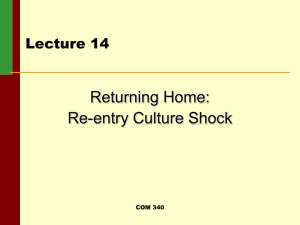
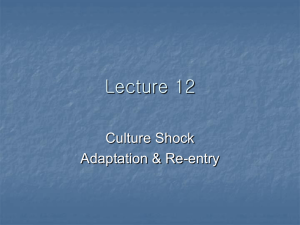

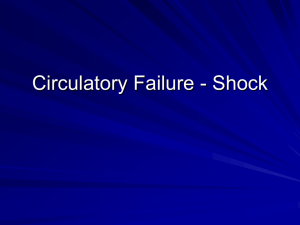
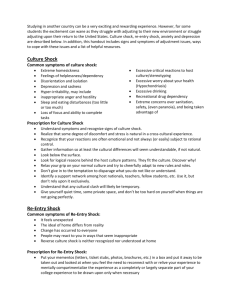
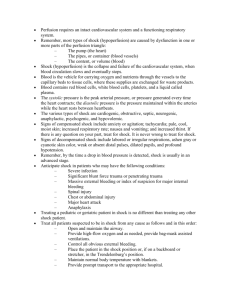
![Electrical Safety[]](http://s2.studylib.net/store/data/005402709_1-78da758a33a77d446a45dc5dd76faacd-300x300.png)
